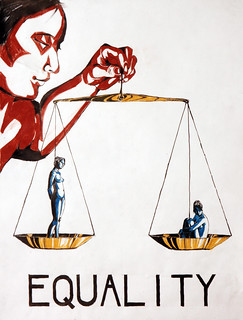"Despite the fact that the word for helper, Ezer, is most often used in the Bible to describe God as our helper (and never used to describe animals as our helpers), when Piper and Grudem read Genesis 2 and find the word helper applied to the woman, they toss out the sweeping human identity statement of Genesis 1 where woman, just like man, fully bears God’s image and is fully called to fruitfulness and rulership. Instead, they banish woman from the man’s side and place her alongside the animals. She loses her place among the rulers and must join the ruled."
You can read the rest here by downloading the PDF of Hermeneutics in pink and blue from CBE International. Here is their statement on equality: statement on men, women, and biblical equality !

Here's more of what caught my eye:
- The promise of salvation is not simply that we escape from the wrath of God, but that we receive empowerment and transformation for the present life. We are restored to our calling as Genesis 1 image-bearers. Hence, 1 Peter 2:9 defines the renewed identity of believers as “a chosen people, a royal priesthood, a holy nation.” The Bible speaks of all this transformation and empowerment as offered to believers without any qualification by gender. Yet, for traditionalists, while a male’s renewal in Christ leads, at least potentially, to offices of authority within the church, renewal for females does not.
- Is this what God had in mind when the oneness of Adam became the oneness of male and female? Is this what Paul had in mind when he wrote 1 Timothy 2:12? Are we truly not a single human race in two sexes, but rather two distinct human races?
- The bedrock of our human identity is given to both males and females in Genesis 1. Nothing that follows in Scripture—neither specific behavioral directives such as 1 Timothy 2, nor regulations concerning existing social orders and structures such as slavery, polygamy, or patriarchy—redefines our original, God-given, human identity.
- While the full humanity of Genesis 1 has been allowed to define maleness, tragically, it has been stripped away—systematically and relentlessly—from females. Under some theologies we are left with barely enough humanity to make a single rib.

Update: Found a list of articles shared in Facebook.
I have not yet checked out all the links, but here's a quote from the article by Carl Cosaert of Walla Walla:
"A plain reading of the passage reveals that Paul is not speaking about church leadership and authority, or ordination. He is talking about the way women should relate to their husbands. The passage says nothing about the headship of all men over all women. If anything, the passages affirms not only the right of women to pray in public, but also to prophesy, which is a form of teaching."
The original post from Facebook:
...here are some links I posted half a year ago. Lots of good resources there:
RESOURCES ABOUT WOMEN IN MINISTRY
The worldwide study in the Adventist church of the theology of ordination and women as leaders and pastors has created a lot of discussions, and several people write to me asking for more resources.
There is now a preponderance of excellent Adventist material showing why God is calling both men and women as leaders and pastors. Here is a small selection:
My own paper for the Inter-American Division discusses Luke-Acts and shows how the current SDA practice of ordination is based on ecclesiastical needs at the time and does not flow directly from the New Testament:
Actually, our practice of ordination (particularly the way ordination is understood and argued by those against women's ordination) is more indebted to medieval Catholic theology than to Scripture, as Darius Jankiewicz of Andrews University demonstrated (a rather long video, but watch at least the first hour, you will not regret it):
The North-American Division has produced a great collection of exegetical and theological papers, all but one are in favor of women in leadership:
Carl Cosaert of Walla Walla summarized well some of the arguments in favor of women in ministry at the recent Annual Council:
Virtually all the professors of Andrews University, the leading theological institution of Adventism, have rejected the concept of "masculine headship" (a doctrine espoused by many who are against women in leadership):
Actually, the masculine headship concept is a new theology in Adventist circles, originating in the 80s with Bacchiocchi who was influenced by certain Calvinist headship-theologians. The history of the new headship concept in Adventism is summarized well by Gerry Chudleigh (Pacific Union Conference):
Jon Paulien, one of Adventism's leading New Testament scholars, explains why he rejects the male headship doctrine:
Ellen White and the Adventist pioneers had to deal with many of the arguments against women preachers a hundred years ago (since Ellen White was a female preacher and leader). Martin Hanna (Andrews University) and Cindy Tutsch (Ellen G. White Estate) have gathered many of Ellen White's statements, as well as important biblical passages in favor of women pastors in a useful book published by Pacific Press:
When all is said and done, God must be allowed to be God and have the prerogative to call whoever He wants to whatever ministry He chooses. This is not about "women's rights" as much as it is about God's rights, as Kessia Reyne Bennett reminds us:



No comments:
Post a Comment